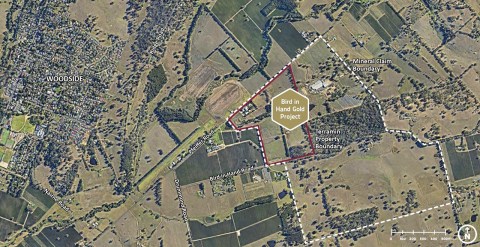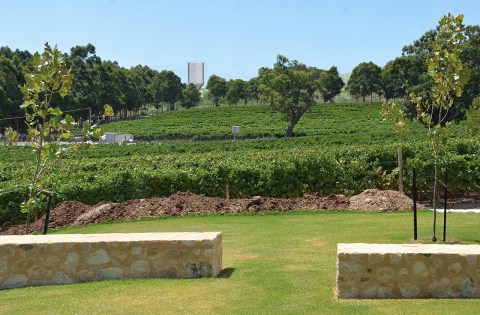Supreme Court fight over Adelaide Hills gold mine refusal
A mining company is about to legally challenge the state government’s “irrational” decision to stop it reopening a gold mine at Woodside, saying it contradicted departmental advice and too much weight was given to the concerns of nearby wineries.

ASX-listed mining company Terramin Australia is seeking to quash Energy and Mining Minister Tom Koutsantonis’ February 2023 decision to refuse its application to revive the historic Bird in Hand gold mine at Woodside.
A two-day trial overseen by Chief Justice Chris Kourakis set to begin in the Supreme Court on Monday.
Adelaide-based Terramin claims in court filings that the Minister’s decision was “not based in evidence or on scientific grounds” and was “unintelligible and/or irrational in the face of the very thorough and detailed Assessment Report” produced by his department.
Terramin also claims it spent more than $15 million over its four-year application process before being rejected. The company is seeking legal costs from the state government.
A spokesperson from Koutsantonis’ office said the state government “followed proper processes and will be strongly defending the legal proceedings”, adding that it was “inappropriate” to comment further.
The Bird in Hand gold mine is located around 2km east of Woodside near prime Adelaide Hills vineyards. The site was once home to around 17 gold mines that operated between the 1880s and 1930s.

Terramin purchased the land in 2015 and applied for a mining lease in 2019, but the project was opposed by neighbouring landholders and vineyards including Bird in Hand Winery and Petaluma Wines due to concerns about potential environmental impacts.
After a lengthy assessment and consultation process, the Department for Energy and Mining produced a 255-page assessment report that deemed Terramin’s project “can be undertaken in an environmentally responsible manner”. The department also said Terramin’s proposal satisfied all relevant regulatory requirements.
You might like
But Koutsantonis exercised ministerial powers to reject the project on February 8, 2023, saying at the time that “there remains a possibility this proposed short-term mine may adversely affect the established and significant long-term agricultural and tourism industries of the Woodside area immediately adjacent the project areas”.
His decision was lauded by independent Hills MPs Dan Cregan and Rebekha Sharkie as well as local agricultural groups and wineries, which had an at times acrimonious relationship with Terramin.
Terramin lodged an appeal with the Supreme Court in August 2023 and has since filed three statements of claim pleading its case.
A significant portion of Terramin’s case is based on the Department’s Assessment report which it says “gave a positive assessment” of the gold mine application. The government’s lawyers, however, argue that the Minister “is not bound by any conclusions or recommendations contained in the Assessment report”.
In its latest filing with the court on August 20, Terramin’s lawyers also contend that Koutsantonis may have “uncritically accepted unsupported assertions” from neighbouring wineries Bird in Hand, Petaluma and Artwine “as to the potential impact the mine would have on them”.

“The Applicants held a reasonable expectation that their applications would be subject to an evidence-based scientific review, assessment and decision which did not require the complete elimination of impacts and risks to the environment and that they would be accorded procedural fairness,” Terramin’s statement of claim states.
“Contrary to that reasonable expectation, and without prior notification to the Applicants, the Minister’s decisions were not based in evidence or on scientific grounds.
“And the Minister concluded that any possible risk or impact to the immediately adjacent industries asserted by Bird in Hand Winery, Petaluma and ArtWine was unacceptable thereby denying the Applicants consideration of their applications according to their reasonably held expectation.
“The Minister’s decisions did not comprise a balanced assessment of the economic, social and environmental impacts of the proposal and a risk-based approach to determine what impacts must be managed, but rather the only matter taken into account by the Minister was what he considered to be the potential risks to the environment of the proposed mine.”
The mining company’s law firm, Finlaysons Lawyers, has also found media interviews and statements made by Koutsantonis and the department over the last nine years to make its case.
This includes an interview Koutsantonis gave to ABC Radio Adelaide on May 3, 2023 after his decision to reject the mine in which he said: “I expect these three wineries now to invest because in their opposition to the mine, they were out there saying we have all these plans for massive developments of our offering for our international renown wine region.”
Stay informed, daily

“We have now sterilised that site from mining,” Koutsantonis said at the time, according to Terramin’s court filing.
“Now it’s on Bird in Hand, Art Wine and Petaluma who argued strongly against that mine.
“They’ve said to us that there are massive investments they want to make in their business to try and improve their tourism offerings, to improve their wine offerings, their cellar door offerings. I’d like to see them.”
Terramin asserts that if this was a factor in Koutsantonis’ decision, then that decision “was affected by jurisdictional error”.
“[Because] the Minister took into account an irrelevant consideration and an erroneous fact, namely, that he (wrongly) considered and/or expected that the winery businesses adjacent the BiH Mine site (namely, Bird in Hand, Art Wine and Petaluma) would make ‘massive’ new investments,” Terramin claims.
“Whether third parties might make investments in businesses not the subject of the application was irrelevant to the exercise of the statutory power contained in [sections] 34 and 47 of the [Mining] Act (and in any event no such investments were to be, or are to be, made).”
In its response filed with the court on September 3, 2024, the Crown Solicitor’s Office on behalf of the state government said Koutsantonis’ decision has “an evident and intelligible justification”.
They also denied that the Minister in making his decision “considered whether ‘massive’ new investments would occur at the relevant wineries”, although later said that “in any event… the proposed expansion may be put at risk had the minister granted the mining lease”.
“The Mining Act provides that each application for a mining lease and miscellaneous purposes licence is to be determined individually by the Minister,” the government’s lawyers said.
“The Respondent otherwise relies on the submissions from wineries in the immediate vicinity as to whether wineries can co-exist with the proposed Bird in Hand mining operations.”
The government also asserts that the impact of mining operations on adjoining landholders “is a relevant consideration” to the exercise of ministerial discretion, adding that third party interests “are relevant to whether or not to grant a mining lease”.
“Assessment of the economic benefit of the proposed mine also required an assessment of its impact on the agricultural and tourism industries of the surrounding region,” the government said, adding that the Minister had access to submissions from Accolade Wines and Bird in Hand Winery before making his decision
“It was open to the Minister in the exercise of his discretion to determine whether the relevant risks had been adequality addressed by the Applicants and he was not bound by the Assessment Report.”
The state government is seeking costs from Terramin and denies the mining company is entitled to any of what it is requesting from the court.
As to the claimed $15 million spent by Terramin on the failed application, the state government said, “the amount, or any money, spent by the Applicants in preparing the applications for a mining lease and miscellaneous purposes license is irrelevant to the grounds of review”.








